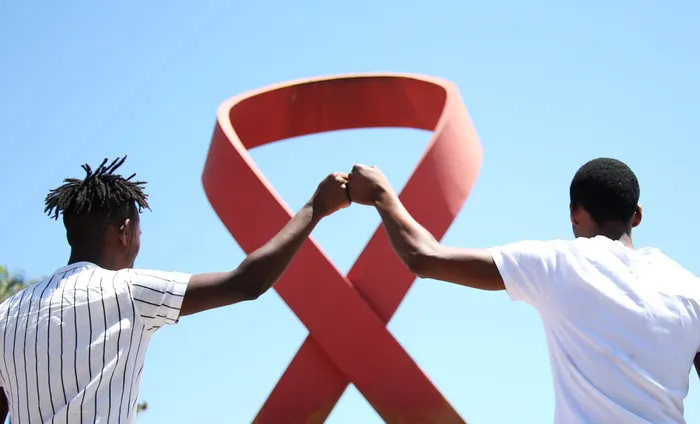Aids activists angry as US offers only token HIV drug doses and no scaled up production

Injectable lenacapavir, a revolutionary HIV prevention tool, has potential to considerably reduce new infections.
Image: Tumi Pakkies/ Independent Newspapers
CIVIL society activists have called on the South African government to take decisive action, criticizing the United States for what they describe as “bullying” and a token donation of the breakthrough HIV drug Lenacapavir (LEN-LA).
In a statement issued ahead of World AIDS Day, activists highlighted the scale of need in Africa: at least 10 million people require LEN-LA to help reach the global goal of a 90% reduction in new HIV infections by 2030. By contrast, the US has pledged doses for just 300 000 people worldwide in 2026.
“Africa and the Global South are being offered merely symbolic handouts, while Gilead and donors shape markets to serve corporate and geopolitical interests, not urgent public health needs,” said Fatima Hassan, Director of the Health Justice Initiative (HJI). “By procuring a minuscule number of doses, Gilead can claim that LEN-LA is ‘introduced’ in Africa, creating demand and laying the path for commercial bullying instead of introducing the product at actual cost and at scale. This is a profit-seeking, corporate strategy dressed up as solidarity.”
The statement comes days before the G20 summit in Johannesburg. Activists said the US has remained at political loggerheads with South Africa, citing claims of racism and genocide.
South Africa, which accounts for 14% of all new HIV infections globally, has been excluded from the US LEN-LA programme. Neighbouring Eswatini and Zambia will each receive 500 doses. The activists say that under a reallocation of Global Fund resources, South Africa is expected to receive enough doses for 480 000 people between April 2026 and 2028. However, this is projected to avert only 5 000 of the country’s estimated 180 000 new HIV infections per year. .
LEN-LA, a twice-yearly HIV pre-exposure prophylaxis (PrEP) injection developed by Gilead Sciences, provides nearly 100% protection against HIV infection and has the potential to significantly reduce new cases, particularly among pregnant and breastfeeding women.
“Protection for only 300 000 people is insulting, compared with the unmet need for HIV prevention, and the superiority of LEN-LA when compared with oral PrEP,” said Bellinda Thibela, Health GAP’s International Policy and Advocacy Co-ordinator. “Instead of crumbs, the US should be providing millions of LEN-LA doses to alter the course of the HIV pandemic and repair the harms caused by their illegal and deadly cuts to HIV programmes since January.”
Activists said that since January 2025, US stop-work and funding-freeze orders have disrupted HIV testing, treatment and prevention programmes. Most USAID-funded PEPFAR awards were terminated, and PEPFAR funding was cut by almost 40%, leaving budgeted funds unspent and defying Congressional intent.
The statement also highlighted that the US negotiated bilateral Memoranda of Understanding (MoUs) in 18 African countries, which activists say continue funding cuts, restrict prevention, particularly for key populations, and aim to end programmes within two to five years. “HIV testing has fallen, infections have increased, and treatment has stalled, causing far more deaths and illness than the US’s small LEN-LA donations will prevent,” said Sibongile Tshabalala, Chairperson of the Treatment Action Campaign (TAC).
Activists also raised concerns about Gilead’s rollout strategy. Of the six voluntary licensees, no Sub-Saharan African manufacturer has received a license, despite local capacity for injectable production. Gilead has not yet filed with India’s regulatory authority to accelerate generic production and has prioritised registration in only 22 low- and middle-income countries, delaying supply for millions. Generic LEN-LA could cost as little as $25 per year once sufficient volumes are achieved, they said.
“Tying access to political compliance and limiting generic production will unnecessarily prolong the pandemic,” Hassan added.
Activists said South Africa’s private sector is also excluded from Gilead’s initial rollout, limiting access and undermining national HIV prevention plans. They called on the government to issue compulsory licenses to guarantee supplies, demand expanded African licensees, and ensure transparency from the Global Fund on pricing and allocations.
Meanwhile, China announced a new HIV prevention project in South Africa in partnership with UNAIDS, focusing on young people and people who inject drugs.
“South Africa has domestic companies capable of manufacturing quality-assured LEN-LA for local and regional use,” said Tshabalala. “Gilead should license these companies without territorial restrictions and include full technology transfer. If not, the government should act decisively to issue compulsory licenses. Lives depend on it.”